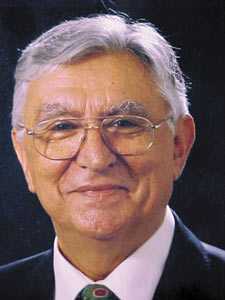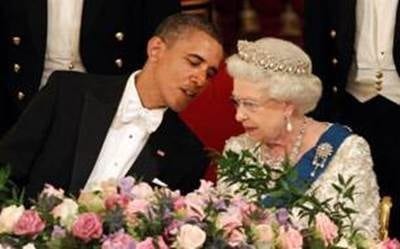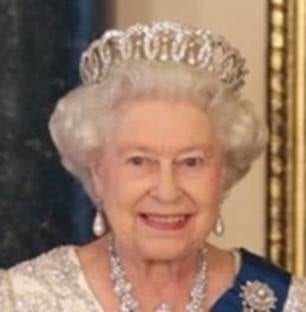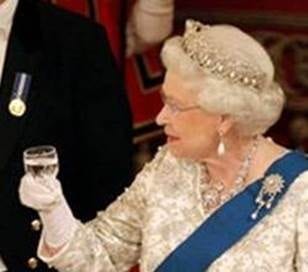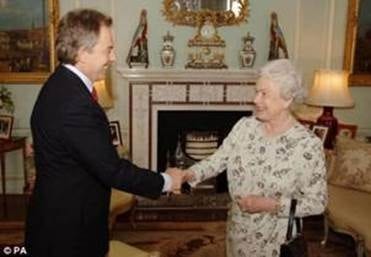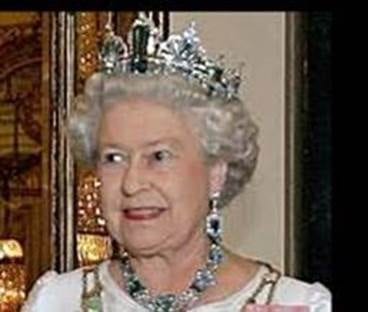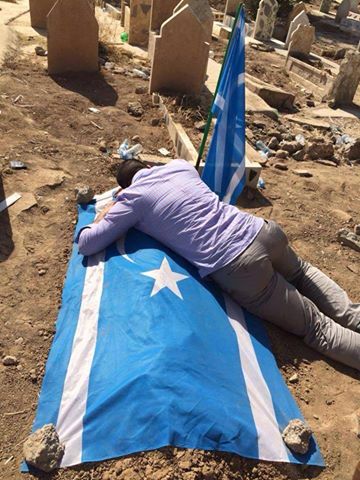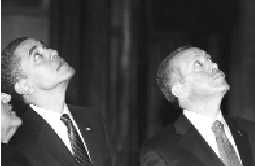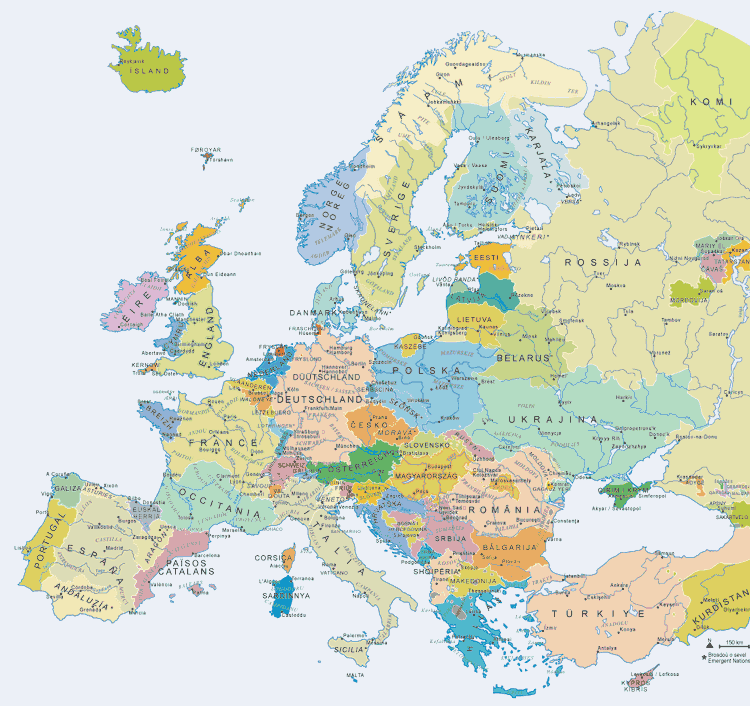
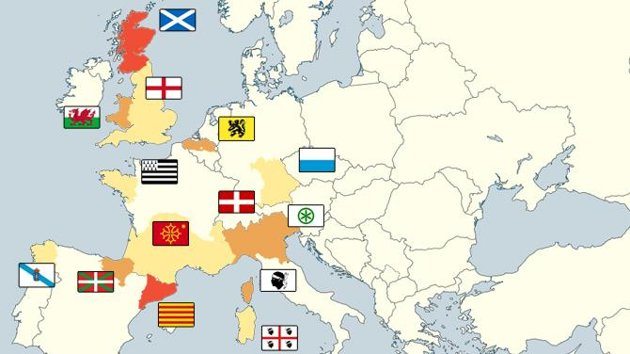 By Prof. Muhammad Shamsaddin Megalommatis
By Prof. Muhammad Shamsaddin Megalommatis
The modern European concept of ‘nation’ triggered ceaseless wars and interminable conflicts over the past two centuries. But was there only one modern European concept of ‘nation’? Certainly not!
Nation – a modern term with no ancient parallels
The word ‘nation’ existed in all major ancient languages that we deciphered, but it did not always have the same meaning and resonance. As we see it, it was very common for several populations that belonged to the same nation to be organized in different states. This was already typified in the world’s first civilization, the Sumerians – an exemplary case.
Before the formation of Ancient Egypt as a state around 3000 BCE, for no less than 500 years we attest the early organization and development of the first Sumerian cities-states, namely Eridu, Ur, Uruk, Larsa, Kish, Lagash, Isin, Shuruppak, etc.
The same situation is observed 2000-2500 years later among the Phoenicians, when Tyr, Sidon, Arwad, Byblos, Beirut and other states-kingdoms coexisted for hundreds of years, at times peacefully and at times at war.
The Assyrians and the Babylonians, both descendents of the Akkadians who were the earliest Semites to form an empire with Akkad (Agade) as capital in the 24th and 23rd centuries BCE, were apparently the first nation in the world to be divided on religious, cultural and ideological grounds. This started happening at the very end of the 3rd millennium BCE.
The phenomenon was repeated in Ancient Egypt, and there too we have noticed great examples of national division due to religious, cultural and ideological grounds; the post-Ramesside period (at the beginning of the 11th c. BCE) is plenty of divisions. For centuries, Egypt was divided and ruled by two or even three parallel dynasties; the 8th – 7th c. BCE clash between the Napatan – Kushitic – Sudanese dynasty (called ‘Ethiopian’ by the Ancient Egyptian Historian Manetho) and the Western Delta dynasty (that Manetho called ‘Libyan’) reflect different readings of the Ancient Egyptian Heritage to which were willingly ascribed the peripheral nations the Berber ‘Lybians’ of Egypt’s western confines and the Kushites-Ethiopians of today’s Sudanese North (who were totally unrelated to the modern Abyssinian tribes that peremptorily and fallaciously use the name of Ethiopia for their country).
Among Ancient Greeks, the extent of the division was such that even among the same tribe’s people (Ionians, Aeolians, etc.) there were several small cities-states formed.
The word ‘nation’ in English is borrowed successively from Old French, and Latin. The original Latin word ‘natio’ meant first ‘native’ (someone relevant to his/her birthplace) only to be progressively extended to all the natives of a place as a group.
At this point it is essential to state that the confusion currently existing in English between the words ‘nation’ and ‘state’ or ‘nation’ and ‘country’ does NOT exist in other languages; in English, at times, ‘nation’ means ‘state’ or ‘country’ and a lot of misunderstanding is due to this confusion, which is highly advisable never to make. Consequently, it is important to clarify at this point that, throughout the present article, the word ‘nation’ is NOT considered as synonym of the words ‘state’ and ‘country’.
This is of primordial importance, and we need to always take it into consideration. In fact, the prevalent concept is that of an indigenous people. Only this concept makes of the term ‘nation’ a real, original value in Humanities; this is due to the fact that the term describes an indigenous community of humans. The term ‘country’ in its origin is purely geographical of context; it means land. Perhaps for several religions, a particular land or piece of land may be considered as sacred or holy, but this approach does never cover all lands and places that appeared as the result of the Creation.
Similarly, the term ‘state’ denotes the governmental mechanism that exists within some well demarcated borderlines. However, there has never been a state to have any value – except that given to it by either humans (the indigenous nation) or God (in Whose Name the state in question may have been established).
Within the context of modern disciplines of Ancient History and Political Science, there has been a long discussion about the main traits and the real essence of a nation. Several authors tried to identify what the concept of ‘nation’ meant to various ancient nations. Quite unfortunately, in doing so, most of the scholars projected their own, contemporary, views and viewpoints onto the ancient texts that they collected to study. The result is therefore untrustworthy,
What is even more unfortunate is the fact that, in Modern Times, the term ‘nation’ did not mean the same thing to all philosophers, political theorists, ideologists and historians – so, every effort to examine what ‘nation’ meant in the Antiquity was definitely linked with the concept of nation each modern author had in his/her mind.
In this regard, Azar Gat was very wrong in viewing in Ancient Egypt the world’s ‘first national state’ that was formed ‘quite early as a unified state, congruent with a distinct people of shared ethnicity’. That is utterly nonsensical! The idiotic Israeli author does not in fact refer to a ‘nation’ but to a ‘national state’, which is a state properly speaking, so irrelevant to the nation itself!
Even worse, there was no one distinct people in Ancient Egypt but many; we don’t actually know how they viewed their participation in their ‘nation’ and how differently they viewed the many ethnic components of their country.
In addition, for several Ancient Egyptian religious doctrines, the Ancient Egyptian gods originated from Napata, the Kushitic-Sudanese capital near today’s Karima, more than 750 km alongside the Nile south of today’s Egyptian – Sudanese borders. For some time, this was a mere religious belief. However, in the beginning of the New Empire (1st half of the 16th c. BCE), this belief became the cornerstone of Imperial Egypt’s Kushitic irredentism, and of the subsequent annexation of North Sudan (what the Ancient Greeks and Romans called ‘Ethiopia’) by Ahmose and Thutmose I.
It is also wrong to hypothesize like Steven Grosby that the small Canaanite states of Israel, Ammon, Moab and Edom underwent a process of nation-formation as result of the Assyrian expansion that led to their subordination to Nineveh. This approach is due exclusively to unrestrained projection of modern theoretical and political viewpoints onto the study topic of the said scholar.
Similarly, Edward Cohen’s irrelevant conclusion that ancient Athens met all modern definitions of nationhood is merely due to this author’s wrong conception of the term ‘nation’ – which he later projected onto his study subject.
Nation – a modern term with two diametrically opposite concepts
In modern times, all possible efforts of conceptualization, identification and contextualization of the term ‘nation’ originate from two diametrically opposed concepts.
Civic nation
First comes the ‘civic nation’ theory which is a vicious distortion fabricated during the formation of Jean Jacques Rousseau’s Social Contract concept (first discussed in his homonymous book in 1762). As he never studied History and in addition was an innovative thinker, J. J. Rousseau had a total disregard of History itself. In addition, he was characterized by an absolute ignorance of the historical nations as they had existed over millennia; in Rousseau’s fictional, unreal, and at times monstrous world, a nation was just a mass population that he should fix as per his silly ideas that he had shaped without taking into account the real wishes and feelings, desires and ideas, traditions and beliefs of any nation whatsoever.
The ceaseless wars that ensued from the French Revolution, and most of the bloodshed occurred across the Earth over the past 250 years are to be credited to Rousseau’s noxious ideas and philosophical system which was an incredible and inhuman aberration of sick ego(t)istic background.
For Rousseau, what matters in a community of people is the formation of a state, which is to be politically legitimate only through the active participation of the entire population, i.e. the citizens of the country. The cynical, absolute and Macchiavellistic ‘general will’ is all that matters in this regard, and this was quite accentuated in later reconsiderations of the concept of ‘civic nation’. This approach draws however from other philosophical systems and theoretical traditions, notably rationalism and liberalism.
In reality, when it comes to the notion of ‘civic nation’, the real identity of a nation does not matter. The ‘nation’ is not viewed as a historical development and reality, but as a group of gangsters with a common will, few materialistic targets, and therefore only target-appended ‘opinions’ as regards the social organization. For this reason, membership of the civic nation is simply voluntary. In fact, many people originating from different nations can gather together in an uninhabited place and …. thus shape a ‘nation’. Unfortunately, the real problems start when these gangsters do not settle in an uninhabited place, but forcefully remove the indigenous nation of a targeted region, thus creating two nations on the same place, one legal (the indigenous one) and one illegal (the ‘civic’ nation of the gangsters).
It is therefore correct to conclude that a ‘civic nation’ is a fake nation indeed.
Why and how all this came out of the mind of a Swiss philosopher who died in France to be posthumously reburied in Pantheon at Paris after the French revolution? To take J. J. Rousseau as per his own words, he thought that through imagination he could reconstitute the History of the Mankind; of course, this thought constitutes in itself an aberration. In the uselessly venerated Discourse on Inequality (1754), he wrote ” The first man who, having fenced in a piece of land, said “This is mine,” and found people naïve enough to believe him, that man was the true founder of civil society”; quite unfortunately for Rousseau and his theories, things did not happen that way, but this was impossible for him to know.
It was actually impossible to form any idea about this subject in the middle of the 18th c., when no Sumerian, no Egyptian Hieroglyphic, no Elamite and no Akkadian texts were deciphered, let alone studied. The only historical past to which J. J. Rousseau had access through modern translations was Ancient Rome and Greece; but these civilizations were too late if compared with the Oriental civilizations (Mesopotamia, Egypt, Canaan, Anatolia) where the first human societies were formed as we now know. In addition, J. J. Rousseau never studied the History of India, Central Asia, and China, while he was fully unaware of the then existing early accounts of the pre-Columbian, indigenous civilizations of Mexico and the Andes. Finally, his contempt for the Christian and Islamic cultures and heritage that existed in his time only deprived him from the reality of the historical continuity and finally drove him to baseless theories that lacked any solid background. His ‘philosophy’ was a fully useless and absolutely unrealistic bunch of assumptions as to just how to create a new ‘human being’ in full rejection of the historical mankind.
Like most of the world’s philosophers, J. J. Rousseau was the child of his time, and this means that he was submerged in news and accounts, reports and narrations about settler colonies, such as the Western European establishments in the area of today’s Canada, United States, Brazil, Argentina, Chile, and South Africa. One must take into consideration that when J. J. Rousseau was writing, Australia was still an unknown and undiscovered land. These Western European colons were in their outright majority heretics, gangsters and renegades of their own civilization that they had abandoned in order to settle in other continents in vain search of profit, exploitation, and material treasures. These desolate colon settlements, deprived of humanity and morality, full of racism against and hatred for the normal, human, indigenous societies, and passionate for unadulterated crime, merciless exploitation of the others, and discriminatory supremacism, offered J. J. Rousseau his study scope and soon became his model for an ideal society whereby freedom, tolerance, equality and individual rights should prevail. This was an oxymoron! He was simply unable to see that his ideas did not fit the European colons’ feelings and desires, and that he had to search for a model elsewhere. The ensued disaster was quite disproportionate.
Modern theoreticians view this ‘civic nation’ as a ‘non-xenophobic’ form of nationalism, because there is no apparent discrimination among the settlers / citizens of the ‘new’ society as regards their origin; Poles who forget Polish culture, Danes who forget Danish culture, and Dutch who forget Dutch culture are equally welcome in a settler colony; but their all white aliens in Asia, Africa, ‘America’ and ‘Australia’. However, both, modern theoreticians and J. J. Rousseau disregarded totally the reality that these settler colonies gravely and discriminately disrupted the pre-existing order of indigenous, non-white societies and civilizations and that, due to the villainous and criminal identity of the settlers, the disruption of the pre-existing order very often entailed an unprecedented bloodshed or even a multifaceted genocide of disproportionate dimensions. In reality, the ‘civic nation’ is a counterfeit nation, an evil human fabrication, and a vicious immoral order.
No positive outcome can ever originate from the aforementioned rudimentary concepts. In reality, as much tolerant as these civic nations proved to be internally, so intolerant they have been externally. The intolerant character demonstrated by civic nations either to the indigenous nations in whose territories the civic nations were criminally founded (in cases like Canada, US, Australia, etc.) or to other, ‘ethnic nations’ in other parts of the world (like the African Somalis, Oromos and Berbers or the Aramaeans, the Azeris and the Baluch in Asia) reached several times the level of racist paroxysm.
It is not therefore strange that, almost one century after J. J. Rousseau, the adaptation of his civic nation theory by Ernest Renan produced a chain of catastrophic byproducts ranging from the Nazi Reich and the Soviet Union, to China’s Cultural Revolution state and the (under preparation) global state of the so-called New World Order.
Ethnic nation
In striking contrast with the fake concept of ‘civic nation’, ‘ethnic nation’ is the real, historical nation, as it existed throughout centuries and millennia. By themselves and not through the involvement of an external factor, nations feature a common language, origin, religion, culture, and behavioral system.
History demonstrates that, on the basis of the aforementioned fundamental traits, nations can be identified unequivocally; because they represent a common communal feeling of distinct identity, true nations (i.e. ‘ethnic nations’) tend naturally and automatically to function as self-determined entities.
The ‘ethnic nation’, e.g. the historical nation, has been the only generator and promoter of historical civilizations as we have known them. By definition, an ethnic nation is more difficult to manipulate, maneuver and deceive than a fake, ‘civic nation’ that can be created on the spur of the moment. The general sum of all the characteristics of an ethnic nation forms the identity of the nation, and, as this is the result of a slow process that took centuries and millennia to be formed, it is practically impossible to extirpate.
In modern times, Johann Gottlieb Fichte (1762 – 1814) made the most convincing and the most comprehensive presentation of what an ethnic nation is. In his venerated Addresses to the German Nation, he revealed the concept of national identity in all its dimensions when forming the exemplary term ‘Germanness’ which has ever since been reproduced in hundreds of copies, such as Romanness, Turkishness, Russianness, Oromoness, Somaliness, Tuaregness, etc.
As it is the real result of History, an ethnic nation is drastically corroborated by means of historical references, and by the ensuing concepts of diachronic existence and national identity, which has in every case several permanent, fundamental traits. To instigate feelings of German patriotism against the French occupation (under Napoleon – in 1808), Fichte referred to the Roman Historian Tacitus who, writing his Annals 1700 years before Fichte composed his flagrant speeches, exemplified German virtues and proverbial heroism.
An ethnic nation organized in a state ordinarily defines nationality as per jus sanguinis (lit. ‘the right of the blood’, i.e. descent from a member of the same nation), and not as per jus soli (lit. ‘the right of the soil’, i.e. birth in the land of the nation), which widely practiced by ‘civic nations’.
It would be wrong to assume that all historical nations are today organized as ‘ethnic nations’. The political choices of the local elites have turned several historical nations into ‘civic nations’ because this suited best their economic – political interests.
On the other hand, it would also be wrong to accept the arbitrary division made by Anthony Smith, who thought that ‘ethnic nations’ belong to non-Western concepts of nationalism as opposed to ‘civic nations’, which reflect the Western view of a settler colony that controls a demarcated territory.
The concept of ‘ethnic nation’ constitutes the rightful global approach to the historical phenomenon of a nation; it is equally Oriental and Occidental – if such division exists, which needs yet to be demonstrated. In what is peremptorily called by ‘Western’ academia as the ‘Western world’, the concept of ‘ethnic nation’ was first described by Herodotus, the Carian Historian who settled in Athens before 2500 years, on the basis of three criteria, namely
– homaimon (‘of the same blood’ / i.e. kinship, origin),
– homoglosson (‘of the same language’ / i.e. common language), and
– homotropon (‘of the same manners’ / i.e. common behavioral system, culture and religion).
However, the concept and the reality of the ‘ethnic nation’ proved to be a major stumbling block for the powers-that-be and for all those who tried to distort and deform the world as per their criminal interests, secret plans, and hidden vicious beliefs. The strength of the national identity was at times revealed as an omnipotent factor able to persistently remain unchanged and unaltered in full defiance of the world’s greatest powers, colonial armies, and diplomatic blackmails or ultimatums.
Civic nation vs. ethnic nation: the fake will always fail
The ominous fact that not all the nations of the world have the privilege to setup their own states and the gruesome reality that hundreds of nations have been monstrously obfuscated within monstrous super-national states clearly indicate that the moving force of the colonial states England, France, and the US, and the ruling administrations of the WW I – WW II Allies fully and systematically supported the concept of ‘civic nation’ and definitely opposed the existence of all ‘ethnic nations’ in many different ways.
The US: a fake nation – realm of gangsters and idiots
This is quite relevant of their nature; the US is by definition a ‘civic state’ that was formed, not as many pretend through secession from the colonial state of England but, via successive, multifaceted genocides of the indigenous nations of the vast territory of which Washington D.C. tragic-comically pretends today to be the unnecessary and unsolicited capital. In real terms of Humanity, Human History, and Humanism, the existence of the criminal state of the US is the greatest scandal and the most evil episode in the History of the Mankind.
The unpardonable acts perpetrated by all the colons, who settled in parts of America north of Mexico, against all the indigenous nations for several centuries before the inception of the US, the inexcusable fact that the decimated, dislodged, marginalized and persecuted indigenous nations were not even consulted in the process of state formation / secession by the so-called Founding Fathers, and the unforgivable attitude demonstrated against the subjugated indigenous nations in their own occupied homelands since 1783 make of the US the World History’s most criminal, most atrocious, and most Satanic institution. Religious, spiritual and philosophical jargon was invented and purposefully used in shameless texts and bogus-declarations to plaster and conceal the above reality.
It is therefore only normal that the diverse instances of the criminal state promoted the evil concept of ‘civic nation’, opposed the human concept of ‘ethnic nation’, viewed with suspicion the ethnic nations’ attitude to derive political legitimacy from their status as homelands of their populations, reviled the ethnic nations’ tendency to function protectively against colonization, occupation, persecution, deracination, racism, physical and spiritual genocide, and constantly denied the right to self-determination, independence and preservation of their National Heritage to ethnic nations peremptorily incorporated in monstrous super-national states (which is the typical case of the Oromos, the Afars, the Sidamas, and the Ogadeni Somalis in Abyssinia – Fake Ethiopia –; the Somalis, the Luo, and the Masai in Kenya; the Furis – of Darfur –, the Beja, and the Nubians in Sudan, and so on).
In a well orchestrated manner, the three colonial states of England, France and the US did their best for ethnic nations not to form a sovereign state (the case of the Azeris whose majority are still under Iranian control is quite indicative), to lose their sovereign state (if they achieved to form one – in this regard, Somalia is the most striking example), or to limit the ethnic nations’ sovereignty to a mere autonomous entity (as in Catalonia) or, even worse, to self-regulated administrative bodies within a civic state (as in Yukatan, Mexico).
France: the world’s most barbaric and inhuman tyranny
Following the so-called French revolution (1789), the establishment of the modern state of France as a ‘civic nation’ on European soil had ominous results for the entire continent and for the world. It first triggered the separation of the world into two fictional and aberrational entities, the West and the East (the Occident and the Orient), theoretically confined to perpetual fight; of course, this was a purely Manicheistic concept, and as such it turned out to be a calamitous reality and a hecatomb for Europe and the rest of the world.
France is not a nation; there is no ethnic nation named ‘France’. On French territory, there have been several ethnic nations that were forced to cohabitate: the Breton nation (Breizh – Brittany), the Bask nation (Euskaldunak), the Catalan nation (Catalunya), the Corsican nation (Corsi), the Occitan nation (lo País d’Òc), the Alsatian-Lorraine populations of the German nation (Elsaß-Lothringen), and the Frankish nation (Langue d’oïl – Standardized Oïl) of the North of today’s France. The latter was imposed as ‘civic nation’ on all the other ‘ethnic nations’ of France as per the tyrannical policies of the French revolutionaries in the 1790s.
The extinction of the subordinated ‘ethnic nations’ was evidently the primary means of survival for the ‘civic nation’ of France; the war declared against the national identity, the cultural heritage, and the native language of France’s ethnic nations other than the Frankish was without precedent in the World History.
When today’s uneducated European politicians and ignorant American statesmen speak of Turkey’s intolerant stance to Kurmanji or Zaza natives, of Iran’s prejudiced attitude against the Azeri, the Baluch and other ethnic minorities, and of Egypt’s bigoted position as regards the Copts, the Nubians, the Beja, and the Berbers, they all forget that the persecution of Breton language in France reached a unique level of paroxysm when Breton schoolchildren were ‘taught’ by the French civic state’s occupation authorities that, in the streets, it was “prohibited to speak Breton and spit on earth”. As early as 1794, the criminal gangster Bertrand Barère declared in the Committee of Public Salvation (Comité de salut public) that “federalism and superstition are speaking the dialect of Lower Brittany” in a contemptuous rejection of communal identity, religion (libeled as ‘superstition’) and language.
In fact, in the name of a democratic society, the most excruciating and brutal imposition of the Standardized Oïl language of France’s North took place, whereas the Frankish ethnic nation became the undisputed model for the new ‘civic nation’ of France. This demonstrates that the genocidal attitude of the French revolutionaries against France’s ethnic nations was similar to the disregard and the disrespect that the American gangsters showed for the subjugated and marginalized indigenous nations across the US territory.
The genocidal attitude of the French revolutionaries is very well documented indeed. Texts dating from the first years after the French Revolution reveal the extent of the deception that led to the aforementioned tyrannical attitude. Here is an example: “Monarchy had its reasons to look like Babel Tower; in Democracy, to leave the citizens ignorant of the national language and incapable of controlling the power is tantamount to high treason”.
Another example of the premeditated genocide (announced by abbot Grégoire in the Committee of Public Instruction in 1793): “In politics, it is far more important than we think to extirpate this diversity of ‘grossly idioms’ (sic!) that merely prolong the infancy of the reason and the senility of the prejudices”. His report was titled “Report on the necessity to annihilate the vernaculars and to universalize the use of the French language”. The terminology used makes even Hitler’s worst and most vicious theories and discourses grow pale.
England: the focus of evil
What the gangsters of the successive US administrations did to the indigenous nations whose territory they confiscated, and what the Frankish nation of France’s North did to all the ethnic nations that were engulfed in the abominable, tyrannical state of the Nouveau Régime, the English did to the Irish, the Scots and the Welsh. In fact, only the processes differed slightly.
English tyranny and monstrosity in Wales
For Wales (Cymru), the troubles started with the Treaty Aberconwy (1277); it was then proved that peace is not always better than the war. After numerous wars between Llewelyn ap Gruffudd and Edward I of England, the treaty granted end of hostilities, but also stipulated that after the death of the King of Wales, Welsh independence would end and the country would become part of England. The treaty was the result of the treachery of minor Welsh princes who had sided with the enemy; these potentates soon become disillusioned and started a revolt in 1282. Llewelyn ap Gruffudd led the revolt and after several battles, he rejected to abandon his nation that his forefathers had ruled since the ‘days of Kamber son Brutus’ (the heroic times’ King of Cambria that was the original name of Wales). He was killed in an ambush during the Battle of Orewin Bridge. As per the barbaric customs of the incestuous English gangsters, Llywelyn’s head was cut off, sent to London and there set up in the city pillory for a day and crowned with ivy (to dishonor the dead Welsh King as king of the outlaws) only to be later carried by a horseman on the point of his lance up to the Gate of the Satanic Tower of London where it was left for more than 15 years.
Llywelyn’s successor Dafydd continued fighting through 1283, until he was captured along with his family, transferred to England, condemned to death by the Satanic Parliament of England, and consecutively hanged, drawn and quartered (: cut into four pieces). Wales was then stripped of all royal insignia, regalia and relics, and Welsh royal properties were robbed and confiscated. The unprecedented English terror did not deter Welsh national feelings, and already in 1294 a revolt was led by Madog ap Llywelyn.
Meanwhile, the infamous Statute of Rhuddlan (1284) had imposed the alien English ‘common law’ to Wales. English authority was successively rejected by Llywelyn Bren (1316 – 1318), who led a rebellion, Owain Lawgoch, who planned twice to invade Wales with French support only to be assassinated by English agents in France (1378), and Owain Glyndwr (King of Wales / Tywysog Cymru 1400 – 1415), who repeatedly defeated the English armies and reunited Wales for some years. The villainous English did not succeed to capture him, and despite the mythical sums of money they promised, they failed to find one Welsh ready to betray Owain Glyndwr, who had opened the Welsh Parliament at Machynlleth and planned to establish two universities.
That’s why the biased, heinous and rancorous playwright William Shakespeare, who felt inferior to the Welsh legend, portrayed Owain Glyndwr negatively as a wild and ominous person with magical powers.
To address the situation in revolted Wales, the paranoid rulers of England passed silly and discriminatory laws in 1402 prohibiting the Welsh from carrying arms, inhabiting fortified towns, and holding any office. As per this aberration, even an Englishman married to a Welsh woman was not allowed to carry arms!
A later stage of English tyranny over Wales was promulgated by the outrageous Laws in Wales Acts (1535 – 1542) when the Welsh language was banned and the Welsh legal system abolished. In an acrimoniously contemptuous manner, this trash paper describes the Welsh language and the will of the Welsh nation to stick to it in this manner: “because that the People of the same Dominion have and do daily use a speche nothing like, ne consonant to the natural Mother Tongue used within this Realm, some rude and ignorant People have made Distinction and Diversity between the King’s Subjects of this Realm, and his Subjects of the said Dominion and Principality of Wales, whereby great Discord Variance Debate Division Murmur and Sedition hath grown between his said Subjects”.
An ethnic nation, when exposed to tyranny and persecution, naturally sticks to its language and religion to best preserve its identity. Similarly, the Welsh enthusiastically welcomed the first complete translation of the Welsh Bible in 1588, and overwhelmingly rejected Anglicanism when the heretic and murderous king Henry VIII broke with Rome and the Pope. Education in Welsh language was made available under different forms and become a basic means of resistance to English occupation in the 16th and the 17th centuries. Religion became also a means of resistance against English tyranny during the 18th c. Welsh Methodist revival and after the definite separation from the Anglican Church in the early 19th c.; in general, Wales remained predominantly Non-conformist, which is tantamount to rejection of Anglicanism.
Welsh nationalism was best manifested in the late 19th c. through the Cymru Fydd movement’s activities that garnered great support among the Welsh for having reinstated Welsh values and ideas; to best propagate the Welsh determination for National Independence, Welsh nationalists evoked Llewelyn ap Gruffudd, making of him the father of Welsh nationalism, and the National Hero of Wales. Late 19th c. and 20th c. socialism in Wales may be due to Wales’ heavy industrialization, but it was also another form of Welsh resistance to English occupation and of Welsh rejection of the English monarchy. The latest offspring of Cymru Fydd is Plaid Cymru, a political party established in 1925 to advocate independent Wales, which has to be declared in the years to come as the national homeland of the entire Welsh nation (6.5 million people worldwide whereas 16.3 million people have acknowledged Welsh ancestry).
English tyranny and monstrosity in Ireland
For Eire (Ireland, Roman Hibernia), divisions, invasions and epidemics have always been constant parameters of life; following the 9th c. Viking invasions, a mixed Irish-Norse ethnic group was shaped. However, after the decline of the Viking presence, the Norman invasion overwhelmed the numerous small Irish kingdoms and progressively involved the king of England for the first time in Ireland in the second half of the 12th c.; however, the Norman control never extended over the entire Irish territory and several indigenous rulers controlled other parts of the island. A certain Irish-Norman community was formed in the first century of Norman prevalence, but the Gaelic identity of the islanders was soon reasserted and re-strengthened. Decimated because the mid 14th c. plague epidemics, Ireland remained peaceful and divided until the middle of the 16th c. when Henry VIII decided to annex the island in 1536. This triggered successive waves of cataclysmic disasters for the Gaelic nation of Ireland and, although it took almost 400 years of struggles for the Irish to regain control over their country, still a part of the island is occupied by England. The English king’s pretext for the annexation (1541) was the fact that Ireland could serve as basis for future rebellions against his throne or for foreign invasions of England.
An early form of reaction against the English rule was attested already in 1569 – 1573 (the Deasmumhain/Desmond Rebellions in the South-Western part of the island); this event was the normal reaction to the biased attitude demonstrated by Elizabeth I in the case of the antagonism and clash between her cousin Thomas Butler (3rd earl of Ormonde) and the leaders of the Irish Gerald and John Fitzgerald. London’s racist policies in Ireland involved land confiscation, abolition of Irish armies, and severe religious oppression of the Catholic faith. Led by James Fitzmaurice, the Irish marked several victories until English barbarism prevailed in 1575; thousands of civilians were killed in the process, and the corridors that gave access to the English military camps used to be decorated with severed heads on permanent basis. Hundreds of Irish military leaders were executed in the years after the end of the rebellion. At the same time, another rebellion took place in England’s north as Catholic English nobles intended to replace the infamous bogus-queen Elizabeth I with Mary of Scotland; because of the intolerable English barbarism demonstrated in both rebellions, Pope Pius V excommunicated the rubbish queen of the English. Few years later, in 1579, the Second Desmond rebellion exploded to express rightful Irish indignation for the English barbarism and due hostility against the English settlers. It ended in 1583 when, after relentless scorched-earth tactics, the English managed to prevail. A clan chief who betrayed the leader of the rebellion, Gerald Earl of Desmond, was rewarded with 1000 pounds of silver from the English government for his high treason. In a typically English and inhuman manner, the earl’s head was sent to the demoniacal queen of England whereas his body was displayed on the walls of Cork.
During the War between Spain and England (1585 – 1604), Ireland became very often the place of brutal conflicts and battles. After the Spanish Armada failed to coordinate with the Irish and efficiently use Ireland as a basis to invade England in 1588, further colonization efforts took place in Ireland. This led to the Nine Years’ War of Liberation of Ireland (1594 – 1603), a liberation struggle that was undertaken by many Irish nobles who rejected the plantation (: colonization) policies at Ulster and marked many victories over the English armies. The island was then again extensively destroyed and scores of population died because of the scorched earth tactics pursued by the English beasts. More than 100000 Irish were killed and more than 30000 English soldiers died as per modest estimates. With a better coordination with the Spaniards, Ireland would have avoided the calamitous destiny it underwent for more than 300 years after the end of this war.
Land confiscation and plantations continued during the 17th c., involving full dispossession of the Irish Catholic landowners and promulgations of vicious, inhuman, anti-Christian, and purely Satanic laws that were shamelessly called ‘Penal Laws’. In the Irish History’s bloodiest century, two periods of revolution (1641 – 1653 and 1689 – 1691) plunged the country in further disaster and caused an unprecedented hecatomb. For seven years (1642 – 1649), the Cónaidhm Chaitliceach na hÉireann (Irish Catholic Confederation) tried to materialize the wishes and the dreams of the Irish nation. Based at Kilkenny, the Irish nobles, clergy and military leaders set up a General Assembly (parliament) and a Supreme Council (government); however, they pledged allegiance to the king of England, because they were naïve enough to imagine that an agreement could ever be reached. The tensions between moderates and radicals, and both sides’ narrow-mindedness proved to be catastrophic for Ireland. As the English king was engulfed in the Wars of the Three Kingdoms (England, Ireland and Scotland / 1639 – 1651), it was only normal for him to make concessions to the Irish Confederates in exchange for the dispatch of Irish troops to England to fight for the royalists. This was evidently a serious mistake made by the Irish government. The divisions led to the English re-conquest of Ireland by Cromwell (1649 – 1653), which was the most brutal moment of foreign occupation that Ireland had ever experienced, and to the termination of the Confederation. All Catholic properties on the island were by then confiscated and scores of Irish ‘undesirables’ were sent to the Caribbean as slaves.
For one more time in the 17th c., Ireland became the theater of many battles engaged and many fights undertaken, when the disreputable English parliament dethroned the Catholic king of England James II and replaced him with a foreign swindler and disreputable crook, William of Orange (1688). This was a deliberate case of shameful sedition, which the perverse English eulogized as ‘the glorious revolution’ – which shows the extent of their collective corruption, immorality and deviousness. It was only normal for the Irish Catholics to express their support for the deposed king James II. The war of two kings (Cogadh an Dá Rí), which is called in England the ‘Williamite war in Ireland’, lasted two years (1689 – 1691). Rejected in England, James II was accepted in Ireland and appeared in front of a newly composed Irish Parliament (known as the Patriot Parliament) to restore to the Irish Catholics their long confiscated lands. Although supported by France, James II failed to prevail and was defeated after many fierce battles.
A period of unprecedented tyranny started in the aftermath of the Battle of Aughrim (the last fought by the Irish supporters of James II in 1691); the English euphemistically call this period ‘Protestant Ascendancy’, but in reality it constitutes one of the bleakest moments of European History, as it makes Hitler’s Germany grow pale. The inhuman ‘penal laws’ were reinforced, and the English colons took good care that the Irish fail to repeat their rebellions. Deliberate famine caused the death of ca. half a million Irish in 1740-1741. The Irish Parliament was available only for the English settlers to be elected in, and evil projects were constantly under discussion as to how best destroy the island nation in an irrevocable manner. The worst development was of course the fact that the descendants of the alien colons started viewing Ireland as their native country, which shows that the evil policy of ‘plantations’ had generated a counterfeit entity in Ireland, i.e. a new ‘civic nation’.
Following the Irish Revolution of 1798 and the subsequent Acts of Union (1801), the Irish nation deployed ceaselessly further, well-diversified efforts to achieve national independence in the 19th c. The major historical developments revolve around the following events: the rebellion led by Robert Emmet in 1803, Daniel O’Connell’s campaign to achieve emancipation for his nation (1823) and his establishment of the Repeal Association (1830), the Tithe War (1831 – 1838), the Young Irelanders’ rebellion in 1848 (in the middle of the great famine which was again deliberately caused by the English government in order to reduce the Irish population), the revolution of the Irish Brotherhood in 1867, and the longest and most effective of all, the great Cogadh na Talún (Land War), which was an endless agrarian agitation that was led by the Irish National Land League and lasted from 1870 to 1900. The various Land Acts that the English government was forced to promulgate in the very last years of the 19th c. and in the beginning of the 20th c. heralded the end of the colonial rule. Home Rule was stipulated by an act passed by the English Parliament in 1914. The famous Éirí Amach na Cásca (Easter Rising) in 1916, the ensuing period of upheaval (1916 – 1921), and the threat of Irishmen soldiers fighting for the English army in the Western Front during WW I ushered Ireland into the next stage, i.e. the declaration of independence of the Irish Republic, the Irish War of Independence (1919 – 1921), the Anglo-Irish Treaty (1921 – 1922), the formation of the Irish Free State, the separation of the northern part of the island (the unionist descendents of the colons), and the Irish Civil War (Cogadh Cathartha na hÉireann; 28 June 1922 – 24 May 1923), which was the last of so many venomous presents that the pernicious English made to the Irish nation.
English tyranny and monstrosity in Scotland
For the Scottish Kingdom of Alba, interaction and mixed marriages with some of the English kingdoms go back to the 11th c., when King Mael Coluim (Malcolm) III (1058 – 1093) spent many years at the court of the English king Edward the Confessor before fighting and killing Mac Bethad mac Findlaích (Macbeth) to become king of Scotland in his stead. Malcolm III and William of Normandy, the bastard king and invader of England, fought several wars before finally meeting in 1072 and making a peace that justified later claims of sovereignty over Scotland by other English kings.
In the early 12th c. the so-called Davidian Revolution, launched by David I of Scotland, marked a stage of adjusting the government and the society to French and English norms, styles and practices. During the 12th and the 13th centuries, increased affinities and greater interaction between the two nations led several Scottish nobles to see in Edward I of England a possible arbiter for the succession of Alexander III of Scotland when 14 contenders to the throne were about the trigger a civil war in 1286. As Edward I tried to undermine Scottish sovereignty, John of Scotland entered into an alliance with France (Auld Alliance) and this ushered both countries into what is called ‘The Wars of Scottish Independence’ (1296 – 1328 and 1332 – 1357).
Scotland was first occupied by England in 1296, but revolt broke already 1297. The ensuing wars were inconclusive, involving many battles, Scottish raids in England, and English campaigns in Scotland, truces, and executions of the Scottish nobles {Uilliam Uallas (William Wallace) in 1305}; it all revolved around the succession to the throne of Scotland and the alliance of some of the pretenders with the English. Three declarations of Scottish independence dating between 1320 and 1328 were sent to the Pope, and finally in 1328, Edward III of England recognized the independence of Scotland by signing the Treaty of Edinburgh – Northampton.
The Second War of Scottish Independence was due to the alliance some Scottish nobles made with Edward III few years later in order to overthrow David II of Scotland and replace him with other pretenders, notably the disreputable thug Balliol who after crowning himself king of Scots declared that Scotland was a fief of England. The French – Scottish alliance was strengthened by the fact that France and England were then engaged in the Hundred Years’ War (1337 – 1453). When David II of Scotland was granted asylum in France (1334) by Philip VI of France, Scottish resistance was led by many Scottish nobles. Victories were marked by both sides until David II returned in 1341. However, in the Battle of Neville’s Cross, David II was captured (1346) and subsequently held prisoner in the Tower of London for eleven years. Released under the terms of the Treaty of Berwick (1357), David II agreed to pay an enormous amount for ransom, and this progressively alienated the Scottish nation from him; at the same time, the country was also devastated by the Black Death pandemics. After David II died (1371), an impoverished, exsanguine Scotland was still an independent nation, and so it remained until 1707 under the Stuart dynasty, a family of Breton origin that had earlier held the office of High Steward of Scotland and, in 1371, rose to the throne of Scotland (Robert II).
During Stuart reign, there were again many interactions and mixed marriages with the English, internal strife between the Scottish kings and the nobles, alliance with France and wars with England (notably the Battle of Flodden in 1513, the Battle of Solway Moss in 1542, and the Battle of Pinkie Cleugh in 1547). However, when James IV of Scotland married Margaret Tudor, daughter to Henry VII of England, in 1503, the perspective of a union between the two crowns appeared for the first time.
The Scottish Reformation movement influenced greatly the historical developments, and following the signature of the Treaty of Edinburgh (1560), the French and the English soldiers left Scotland’s territory and the Scottish Parliament abolished Roman Catholic Christianity. The Scots Confession of 1560 became the formational document of the Reformed Calvinist Christianity to which most of the Scots adhered; it was however enacted in 1567. The Battle of Langside (1568) and the persecution and execution of Queen Mary of Scotland demonstrated the rise of religious fanaticism in Scotland and the ensuing civil war (Scottish aristocrats supporting James VI against Scotland’s nobles who sided with his mother, Queen Mary of Scotland) lasted many years (1569 – 1573).
When James VI of Scotland inherited the throne of England and became James I on England (1603), the two countries were found united under one monarch; however, this was a personal union that did not have the support of the Scottish nation. Quite contrarily, Scots firmly rejected every effort deployed by either James VI of his son, Charles I, to diffuse forms and rites related to Anglicanism, a most reviled and villainous doctrine in Scotland. Re-affirmation of the Scottish identity and cultural integrity was particularly noted in the famous St. Giles riots (1637) when a treacherous effort was made to introduce English-style prayer book into the Scottish Church.
In fact, the troubles had started earlier, when Charles I proceeded to St. Giles in 1633 for his Scottish coronation, using Anglican rites on Scottish territory. As the rejection was overwhelming, Scots were very watchful and when, on 23 July 1637, it became understood that another style was introduced in the Mass, a revolt took place. It started when a brave woman, the legendary Jenny Geddes, a merchant, noticed first the alien style, stood up, and hurled her folding stool toward the Dean of Edinburgh, because he had just started to read the unacceptable, alien text. As her ‘cuttie-stool’ was flying towards the Dean’s head, Jenny Geddes yelled:
- Devil cause you colic in your stomach, false thief! Dare you say the Mass in my ear?
The religious service was interrupted by the ensuing riot, and although the rioters were removed by the soldiers, the news spread immediately across the city, and a revolt took place in Edinburgh, as the city magistrates were assailed in the City Chambers. The thunderous voice of the Scottish nation was heard, and the authorities were forced to negotiate; a Committee was appointed for the negotiations with the king’s council. As Charles I rejected to withdraw from Scotland the Anglican liturgy, the Scots revolted and the old National Covenant of 1581 was convened again in February 1638. Reformed religion was maintained in the form in which it was spelled out in 1580 and all innovations were rejected; however Scots expressed their loyalty to the king.
The members of the Covenant (also known as Covenanters) confronted the established church. In November 1638, the General Assembly of the Church of Scotland deposed all bishops and banned the prayer book; this ushered Scotland into the Bishops’ Wars (Bellum Episcopale / 1639 – 1640) involving many battles between the Covenanters, the Scottish royalists, and the English army. Weakened in England, Charles I had to compromise and even went to Scotland in 1641 and accepted the decisions of the Scottish Parliament as he had already done with the decrees of the General Assembly of 1638. As per the terms of this compromise, the Scottish Parliament had the right to challenge the actions of his ministers.
During the ensuing Wars of the Three Kingdoms (parts of which are the Scottish Civil War, the Irish Confederate Wars, and the English Civil War / 1639 – 1651), Scotland was effectively ruled by the Covenanters. Scottish army was sent to Ireland against the Irish Rebellion of 1641 with the limited scope of protecting the Scottish settlers. In 1643, the Solemn League and Covenant was promulgated and, as per its terms, the preservation of the religious reform in Scotland was reconfirmed, whereas reformation of religion was demanded for England and Ireland. The Covenanters sent several armies to England to fight for the victory of the Parliament over the king, and the Scottish troops played an important role in inflicting a serious defeat to Charles I. However, this triggered the Civil War in Scotland (1644 – 1647), as the Scottish royalists rejected the Covenanters’ extremism and revolted. Following several battles and an early royalist success, the war ended with Charles I surrendering and being held captive. In a secret Engagement, the imprisoned king promised to help Scots implement Presbyterianism in England; an army was set up for this, but it was destroyed by Cromwell in 1648, and Charles I was subsequently executed (decapitated) in 1649.
Charles II was proclaimed as king by the Parliament of Scotland 6 days after the decapitation of his father, but this was rejected by the English Parliament. After defeating the Scottish royalist army loyal to the son of Charles I in the Battle of Dunbar (September 1650), Oliver Cromwell invaded Scotland; he sent the captives back to England where many of them died of starvation and exhaustion, whereas their survivors were sent further on to the Caribbean as slaves. To survive, Charles II had to fight the Battle of Worcester (1651), and after being defeated by Cromwell, he had to escape to Europe where he spent nine years in exile.
Scotland was under severe persecution when incorporated into the Puritan England; there was no independent church, no parliament, no government, and no legal system. The annexation was promulgated by the Tender Union (1652), which abolished the Scottish Parliament, offering Scotland 30 seats in the English Parliament. However, the Act of Union was approved only in 1657 due to the political turmoil.
Following the restoration (1660), Scotland became again an independent kingdom under Charles II, but the re-imposition of episcopacy and a series of other measures were greatly resented by the Scots (they were prevented from any lucrative business in English colonies as per the English Navigation Acts). Independent assemblies, known as conventicles, gathered the support of the majority and led to the revolt of 1679 which was defeated. Scotland was terribly persecuted until 1685 when James VII of Scotland (and James II of England) succeeded his brother; this period has been described as ‘The Killing Time’ and thousands were executed in excruciating manner.
The pro-Catholic measures and policies introduced by James VII led to the sedition of seven English high traitors who invited William of Orange, Stadtholder of Holland, to rule England (a bleak moment of European History that the perfidious English shamelessly called ‘glorious revolution’). James VII had to flee, but after the imposition of the Dutch swindler and disreputable crook, supporters of James VII entered into several battles, fighting to overthrow the alien rule of the sexually perverse William of Orange (who ruled as William II of Scotland).
Economic disasters befell Scotland at the very end of the 17th c. due to various combined reasons and this forced the Scottish Parliament to take several measures like setting up the Bank of Scotland and financing a great colonial project (known as Darien scheme); the latter turned into a disaster particularly because the perfidious English of the ‘West Indies’ did not come to help the Scots colons when they were attacked by the Spaniards (1698).
The union with England (1707 at the times of the reign of Queen Anne, the daughter of James VII) was a desperate act taken without serious thought and after many years of economic adversity. By 110 to 69, the Scottish Parliament adopted the Treaty of Union in January 1707, making of Scotland a mere province of England and replacing all Scottish systems of laws, taxation and currency with the respective English practices. The union was a panacea for Scotland’s aristocracy and landowners, but it was widely reviled and loathed by the outright majority of the Scottish nation.
The three centuries of annexation failed to erase the Scottish national identity, cultural integrity, linguistic diversity, and behavioral difference. Scotland remained another nation, an ‘ethnic nation’ incorporated into the realm of the UK’s ‘civic nation’. The Scots tried many times to reject the English rule that so thoughtlessly a meager majority supported before 307 years.
The unpopularity of Scotland’s annexation to England generated many rebellions and already in 1708, James Francis Edward Stuart, son of James VII, attempted to land to Scotland with 6000 French soldiers and join forces with his supporters who became known as Jacobites. In 1715, the indignation against the rise of George I as successor to Anne of England led to generalized revolt in Wales, Scotland, and parts of England. The Jacobites lost several battles before James landed in Scotland, and he had therefore to flee back to France. In 1719, the Jacobites counted on Spanish assistance, but were finally defeated on the Battle of Glen Shiel. In 1745, James’ son, Charles Edward Stuart, landed in the Hebrides and, after gathering support, he sailed to Scotland and invaded Edinburgh. He did not only prevail over the English forces in the Battle of Prestonpans, but advanced into England, besieging and taking several cities as far as Derby. However, there he failed to get support for a Stuart Catholic restoration in the country, and he retreated to Scotland as an English army was approaching. Petty politics prevailed over the national Scottish case, and the liberals managed to regain control of Edinburgh. Following several battles and defeats, and after hiding for several months, Charles had to sail back to France in 1746. Genocidal practices were attested then, as the English army deliberately killed dozens of thousands of Scots, while sending scores to the English colonies as slaves. Gradually, Jacobitism waned and failed to gather support from the main Catholic courts of Europe. With the death of the last pretenders, this movement reached an end.
Terrible oppression matched with extensive corruption was the English method employed in order to preserve Scotland within the loathsome and tyrannical English state. By offering career opportunities and business chances to middle and upper-middle class Scots, the English government tried to make them expatriate to England and in the process lose their identity, language, and culture. In other words, they tried to turn Scotland’s ‘ethnic nation’ into a ‘civic nation’.
Lawless, evil legislation was then produced en masse in England for the purpose of Scotland’s disfigurement, identity destruction, language loss, and cultural disintegration. The Dress Act, the Act of Proscription, the Clan Act, the Disarming Act, and the Heritable Jurisdictions Act, all promulgated in 1746, prohibited Scottish language, forbidding every single aspect of Scottish culture, and crushing the Scottish clan system. In the process, it was prohibited for Scots to bear arms and wear tartans, whereas forced displacement deracinated hundreds of thousands of Scots from the Highlands where the rejection of the catastrophic union was overwhelming. It was an accomplished ethnic cleansing of the Scottish Highlands with full scale transportation of Scottish clans to other locations.
Scottish Law was abolished and jurisdiction by Scottish clan chief prohibited; English Law was imposed instead. ‘Justifying’ the destruction of an ‘ethnic nation’ and the Nazi-like imposition of a ‘civic nation’, Lord Hardwicke rejected the concept of multiple jurisdictions, stating that ‘private jurisdictions’ (as he described the Scottish traditional Law) would endanger liberty by encroaching on the legal authority of a constitutional monarchy. This is enough to make clear how fake a ‘civic nation’ is and how tyrannical it can be.
Pseudo-Christian school prayers for the king of England and his disreputable family were enforced throughout Scotland, whereas many other methods were devised to prevent children from being attached to their Scottish national identity, social organization, linguistic continuity, and cultural integrity (which were called in a typical Nazi-like manner ‘rebellious principles’).
The Highland Clearances are a shameful English euphemism for what is known among Scots as Fuadach nan Gàidheal, i.e. “the expulsion of the Gael”. They consisted in a century-long practice of forced displacement of Scotland’s most authentic, conscious, and traditional part of population. Under the pretext of setting up enclosures for sheep in order to revolutionize agriculture, the Nazi-like government of England expelled the indigenous inhabitants who represented a millennia long historical continuity in their homeland, i.e. Northern Scotland (the Highlands).
The main target was neither the land confiscation – expropriation to the benefit of some noble landowners nor the eviction of the inhabitants who relied on small scale agriculture, but the systematic destruction of the Scottish Gaelic culture. The forced emigration was of unprecedented scale, involving forced resettlement in the Scottish lowlands and the sea coast, and further on to North America or other English colonies in Asia and Australia. The series of events described as ‘clearances’ lasted from the mid 18th c. until the 2nd half of the 19th c. and the result was the total destruction of Scotland’s cultural topography; today, more descendents of the Highlanders live in America, Asia and Australia than in Scotland.
Some of the worst moments of the century-long ethnic cleansing occurred in the so-called Year of the Sheep (Bliadhna nan Caorach – 1792), when tenant farmers arranged a spectacular protest, removing more than 6000 sheep from the land around Ardross. Another particularly atrocious period was the decade 1811 – 1820, when it was common to evict 2000 families in one single day, fully expropriating them from their ancestors’ land. The disreputable and incestuous English aristocracy was the major accomplice in the process as they became the landowners of the confiscated lands; their racist, inhuman and Satanic mentality was epitomized by a sentence written by the filthy duchess of Sutherland in her correspondence with an Englishman: “Scotch people are of happier constitution and do not fatten like the larger breed of animals”. )
Living in England at the time, Karl Marx described the Highland Clearances as spoliation, fraud, robbery and usurpation carried out under ‘reckless terrorism’. In the middle of the 19th c., an entire school of racist philosophers, theoreticians and ideologists rose to pro-eminence in England, trying to ‘prove’ in a ‘scientific’ manner that the Scottish Celtic race was inferior to the Anglo-Saxon; it gathered overwhelming support among the bastard ‘civic nation’ of England.
For Alex Salmond, Scotland’s First Minister, unveiling a 3 m high bronze named ‘Exiles’ in Helmsdale, Sutherland (July 2007) was a minimal contribution to the Immortalizing of the thousands of dead, emigrated and persecuted Scots.
Scottish literature became for centuries a means of anti-English resistance, and among many great poets of the Ossian circle, Robert Burns (1759 – 1796), Scotland’s national poet, proved to be the herald of the Gaelic Revival in the late 19th c., of the Scottish Renaissance in the 20th c., and of the Scottish Gaelic Renaissance in our times. The Scottish Covenant, proposed in 1930, promoted in 1939, and signed by two million people in 1951, exemplified these demands, whereas the Scottish Unionist Party declined and was duly dissolved finally in 1965. As devolution referenda strengthened Scots’ political consciousness, the Scottish National Party gathered momentum.
A higher stage was attained when Mike Russell, Member of the Scottish Parliament (SNP), spoke in Scottish Gaelic in a European Union meeting in May 2010. It became evident that full independence, and not mere home rule, is the demand of Scotland’s new generation. Alex Salmond’s defeat in the Independence Referendum (18/9/2014) reflects basically a wrong choice; instead of viewing Scots as a ‘civic nation’, SNP must rediscover and reassert Scotland’s ethnic nation in all its characteristics, dimensions and capacities.


